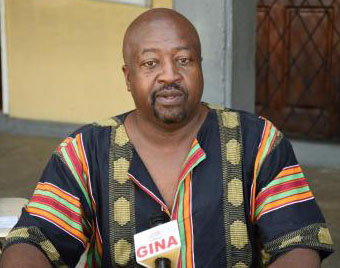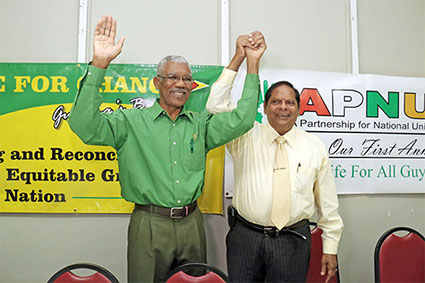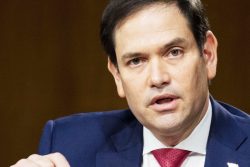By Dr. David Hinds
Any proper evaluation of the current government’s performance in office almost three years since its rise to power must be done against the background of the expectations when it came to power in 2015. Understandably, governments tend to compare themselves to their opponents’ stints in office, but ultimately a government must be judged on its own merit and circumstances. In this regard, my central argument is that the APNU+AFC coalition represents a historical moment in Guyanese post-colonial politics.
As the country’s first truly plural government which came to office with the support of an ethnically and ideologically diverse electoral base, it (the APNU, AFC coalition) stood the best chance of using government to move the country beyond its ethnically grounded reality to a more enlightened and inclusive existence. Further, given the country’s previously entrenched entanglement with authoritarian governance and the coalition’s own enlightened anti-dictatorial rhetoric and promise, the new government had the best opportunity to lift the country’s democratic profile from the depths of political depravity. In other words, the APNU+AFC government was poised to qualitatively transform Guyana’s politics and society into a truly democratic experiment.
It is against this background that I offer these comments.
Background

To properly contextualize my evaluation, some background notes are necessary. The APNU+AFC Coalition came to power in May 2015 amidst growing concerns in Guyana over the direction of governance in the country. After five decades of one-party rule by the PNC (1964-92) and the PPP (1992-2015), the country’s politics had not matured beyond where it was at the time of political independence from Britain. Authoritarian rule was more the rule than the exception with both parties showing scant respect for the rule of law, the protection of civil liberties and the general tenets of democratic governance while in office. In the final analysis, there evolved a serious erosion of popular confidence in the ability of government to fundamentally transform the country’s political economy from a post-plantation outpost to a viable space in which all the country’s ethnic groups could feel secure.
While the PNC’s ethnic agenda was subtle, the PPP was much more open about its use of the government and state to empower the elite of the ethnic group from which it draws its support even as it systemically disempowered the masses of the opposing group. The PNC’s ideology of paramountcy of the party dispensed with any pretense of democratic governance and brutally crushed any opposition to its rule, including the use of political assassination of opponents. The PPP, on the other hand, was only less subtle as it used the mask of democracy to govern in much the same harsh manner of its predecessor. While the PNC engaged in electoral malpractice to remain in office, the PPP nurtured and exploited the uncritical support of the majority Indian Guyanese community to win successive elections. Finally, while both parties paid lip service to inclusive governance, they monopolized power when in office to the almost total exclusion of the political opposition.
This began to crack at the 2006 elections with the emergence of the Alliance for Change (AFC) whose birth coincided with the death of the PNC’s leader, Desmond Hoyte and the rise to power of Robert Corbin. Sections of the PNC’s base were frustrated by its lack of militancy and did not accept Corbin’s leadership. Many turned to the AFC which, under Raphael Trotman’s leadership, promised independence from the two big parties and the development of a ‘third force.’
The AFC captured approximately eight percent of the vote in 2006 and in the process reduced the PNC to its lowest electoral showing ever.
But Corbin and the PNC countered by aggressively courting the WPA to form the APNU in 2011. With the formation of the APNU and Corbin’s decision to cede the leadership to David Granger, African Guyanese at the 2011 election left the AFC and voted for the APNU. David Granger’s presence at the top of the ticket and WPA’s presence made a definitive difference in terms of mass perception of the democratic credentials of the Coalition.
However, the change of the AFC’s leadership from Trotman to Khemraj Ramjattan and the party’s recruitment of Moses Nagamootoo made the party palatable to sections of the Indian Guyanese community which had become embarrassed at and frustrated with the PPP’s excesses but did not want to touch the PNC. The AFC’s promise of “Never PNC” resonated with them and the party repeated its success at the 2011 election.
But the rise of the APNU and the PPP’s loss of its parliamentary majority presented a dilemma for the AFC. Should the party hold on to its “independence” stance and remain in opposition or should it join the APNU to oust the PPP? It chose the latter and negotiated a coalition with an APNU, which despite its success in 2011 knew that it needed Indian Guyanese votes to remove the PPP. So, it too had to make some difficult choices. It had to concede much more to the AFC than it wanted to. It was this realignment of the political architecture that brought the Coalition to government in 2015.
Mixed Performance
Given these expectations, it is difficult not to conclude that after almost three years the government has not lived up to expectations. Has the expected transformation or signs of it materialized? The answer has to be a resounding no. In many respects, there has not been any decisive break with the past in politics, economics or governance—there has been a change in government but not a change in regime. This is not to say that the government has not achieved some positive things. It has. But these have not amounted to any qualitative change in governance.
On the bright side, the government has put a break on the criminalized state—there has been a noticeable delinking of the state from organized crime. The outcome has been a tempering of the authoritarian state even if it has not been tampered with. The government has shown some inclination to tackle official corruption although it has not done so with the haste that it had promised while in opposition. The ordering of audits of government departments and the setting up and eventual empowerment of SARA have been encouraging signs. But the sloth in acting on the findings of the audits betrays an ambivalence on the part of the government that suggests that it has not yet worked out a cohesive approach to this pivotal campaign promise.
There has been a discernable decrease in official ethnic discrimination in the distribution of shared resources— a phenomenon that had become a big problem under previous governments. But, the disproportionate number of African Guyanese appointments to high office gives the impression of reverse discrimination. This perception has been compounded by the number of ex-military persons who have been asked to fill many of these positions.
In the area of human rights, the government has performed creditably compared to other governments in post-colonial Guyana and the Anglophone Caribbean. Although there are recent signs that the government may be resorting to old approaches to civil liberties as can be seen in the removal of two columnists deemed to be critical of the government from the state-owned Chronicle newspaper, there have not been any systemic human rights abuses. Opposition parties and activists have not been routinely harassed or beaten in the streets—the right to assemble has not been infringed upon. No previous government in Guyana’s post-independence history could boast of such a record.
However, despite these positive developments, the first three years of this government’s tenure would be remembered for a string of negative actions…………..the huge salary increases it gave to Ministers and MPs’; the building of the Durban Park stadium; the Parking Meter fiasco; VAT on private education; the attack on street vendors; the insensitivity over the Walter Rodney COI; the indecisiveness about what to do about corruption; the fallout from the unilateral appointment of the GECOM Chair and the clumsy handling of the downsizing of the Sugar Industry. These are all big things with big impacts on large chunks of the society and will not be easily forgotten. They have become part of the popular consciousness.
There has not been any consistent economic vision. In fact, there has not been any discernable shift from the approach of the previous government from a large policy standpoint………..there is still the over-emphasis on taxation and wooing foreign capital and less investment in local small businesses and in the development of a competitive labour force. As a result, unemployment and its attendant ills still haunt the society. What is particularly disappointing is the government’s inability to arrive at an amicable arrangement with the unions on public servants’ wages. When one considers that this sector of the labour force is dominated by government supporters, it represents a serious blunder on their part.
While the government has made the bold move to deal with the politically sensitive sugar industry, its approach as far as dialogue with the workers is concerned has been less that sterling. The decision to lay off workers without activating adequate compensatory measures was a serious blunder that I think the government is going to be hard-pressed to shake-off.
Similarly, its handling of the oil and gas contract with Exxon Mobil betrays a government that is either bent on political suicide or is plainly inexperienced. The stubborn refusal to make public the details of the contract invites suspicions of secrecy and unaccountability. When the contract’s less than satisfactory benefits to the country is added, there is not much that the government can congratulate itself about in this regard.
It (the government) has not done as well as it should in crime prevention and reduction, largely because it has not approached the problem from a systemic standpoint, adopting instead more of an eclectic approach. The crime situation is a major embarrassment because the high levels of crime cannot be masked by optimistic statistics.
The government’s biggest error is the overconcentration of political decision making within the cabinet and trying to manage the coalition as if it were a single-party administration. There has been a contraction of the decision-making space—its confined almost exclusively to the Cabinet and the Presidency. There has been zero attempt at consultation beyond those councils. The limiting of decision-making to an inexperienced Cabinet and Presidency has been one of the great failures of the last three years. Three is little intra-coalition consultation, resulting in frequent public complaints from at least one partner in the Coalition, the WPA.
Finally, the government has been unable to build any working relationship with the opposition PPP. It is true that trust is a two-way process. A government cannot build trust with its competitor if they do not want to. But at the end of the day, it is the government that would be held primarily responsible. Relatedly, not much has been done on constitutional reform—one of the government’s battle cries while in opposition. There seems to be little appetite for it in the government’s ranks
In this regard social cohesion has turned out to be another gimmick. I think the President meant well when he devised the initiative. But cohesion in a society as divided as ours calls for much more imaginative praxis than we have seen from the government. Government cannot bring about ethnic cohesion, which is really at the heart of social cohesion. The government must be a facilitator, but it must be clear what it is facilitating and how it is going to do that. The failure to lead on this matter has meant that the country is as ethnically polarized today as it was three years ago.
While the government has chalked up these negatives, it has not been able to do one big thing that impacted the popular consciousness in a positive way. Yes, its scope and space have been limited given the mess it inherited, but little to no advantage has been taken of that limited scope and space. Had the government moved aggressively in one or two areas, the story today would have been different. The Coalition has effectively squandered the opportunity presented to them when they first came to power. I honestly believe they have not tried hard enough.










